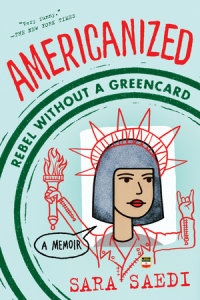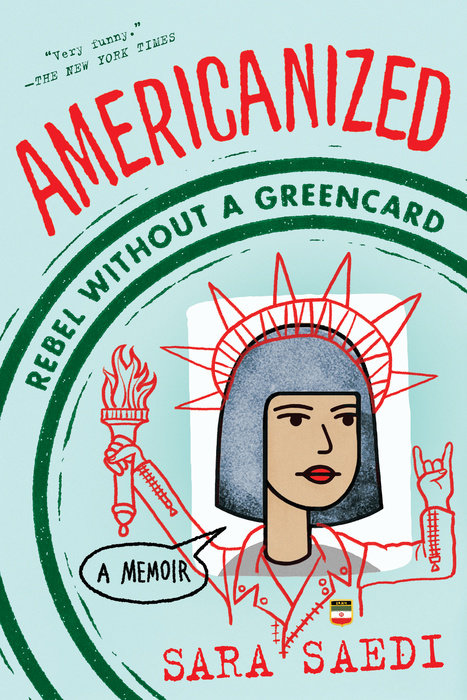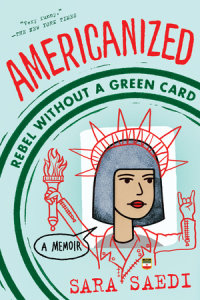Americanized: Rebel Without a Green Card
In development as a television series from Reese Witherspoon’s Hello Sunshine production company and ABC Studios!
This hilarious, poignant and true story of one teen's experience growing up in America as an undocumented immigrant from the Middle East is an increasingly necessary read in today's divisive world. Perfect for fans of Mindy Kaling and Trevor Noah's books.
“Very funny but never flippant, Saedi mixes ‘90s pop culture references, adolescent angst and Iranian history into an intimate, informative narrative.” —The New York Times
At thirteen, bright-eyed, straight-A student Sara Saedi uncovered a terrible family secret: she was breaking the law simply by living in the United States. Only two years old when her parents fled Iran, she didn't learn of her undocumented status until her older sister wanted to apply for an after-school job, but couldn't because she didn't have a Social Security number.
Fear of deportation kept Sara up at night, but it didn't keep her from being a teenager. She desperately wanted a green card, along with clear skin, her own car, and a boyfriend.
Americanized follows Sara's progress toward getting her green card, but that's only a portion of her experiences as an Iranian-"American" teenager. From discovering that her parents secretly divorced to facilitate her mother's green card application to learning how to tame her unibrow, Sara pivots gracefully from the terrifying prospect that she might be kicked out of the country at any time to the almost-as-terrifying possibility that she might be the only one of her friends without a date to the prom. This moving, often hilarious story is for anyone who has ever shared either fear.
FEATURED ON NPR'S FRESH AIR
A NYPL BEST BOOK OF THE YEAR
A CHICAGO PUBLIC LIBRARY BEST OF THE BEST BOOK SELECTION
A SCHOOL LIBRARY JOURNAL BEST BOOK OF THE YEAR
FOUR STARRED REVIEWS!
“A must-read, vitally important memoir. . . . Poignant and often LOL funny, Americanized is utterly of the moment.”—Bustle
“Read Saedi’s memoir to push out the poison.”—Teen Vogue
“A funny, poignant must read for the times we are living in today.”—Pop Sugar
An Excerpt fromAmericanized: Rebel Without a Green Card
Chapter One
A Brief (but Juicy) History of My Birthplace (and My Birth)
I swear on my autographed copy of Ethan Hawke’s debut novel that this chapter will not be dull, so please don’t skim or skip over it. If you won’t take my word for it and have no vested interest in broadening your worldview, here’s the most important takeaway: Iran is not pronounced I-ran; it’s pronounced e-ron. Spread the word. Tell all your friends. Tweet it. Shout it from the rooftops. Correct people. It’ll make you sound smart and cultured. On behalf of my fellow Iranians (e-ron-ians), we thank you.
Now, for those juicy historical details you were promised! Real talk: Iran has dealt with its fair share of strife and political unrest. And while I’m not one to point fingers or lay blame . . . the United States and Britain were totally at fault. Okay, that’s not entirely accurate. The West might not be directly accountable for all of Iran’s drama, but they definitely stirred the pot, back in the early 1950s. During that time, Prime Minister Mohammad Mossadegh ruled Iran. Personally, I consider the man a hero. He was a democratically elected leader, and a progressive. But his main claim to fame was that he nationalized Iran’s oil industry. Prior to Mossadegh, the country’s most valuable resource was under British control. But why let the Brits instead of Iranians profit off of Iran’s most lucrative industry? That’s the equivalent of Kanye West pocketing all the profits from 1989 (the Taylor Swift album, not the year in history). Thus, Iran told the British oil companies to hit the road, and the Brits were predictably pissed. Mossadegh to Britain: “Bye, Felicia.”
So Britain decided to call in a favor to their bestie: the United States. If texting had existed at that time, then Winston Churchill would have sent President Eisenhower a bunch of crying-faced emojis. According to Churchill, they needed to get rid of Mossadegh. The United States was initially reluctant to get involved, but Britain pointed out that Iran’s beloved prime minister had newly gained the support of the Tudeh Party (an Iranian communist party) and the country would eventually go red. (Oh, hell no it wouldn’t. Our man Mossadegh wasn’t even a fan of socialism. Not to mention, the Tudeh Party frequently turned against him.) So Eisenhower said, “We’re in!” And that’s when the CIA and Britain’s Secret Intelligence Service decided to buddy up and formulate a secret coup to overthrow Mossadegh. They called it: Operation Ajax. Possibly named for the mythological Greek hero or the cleaning product. Your guess is as good as mine. It was decided that Iran’s ruling monarch at the time, Shah Mohammad Reza Pahlavi (yes, “Mohammad” is like the “Mike” of Iran), would take over for Mossadegh. Initially, the shah said, “You people are nuts! Everyone loves Mossadegh. You’re asking me to commit political suicide.” But then the United States threatened to dismiss the shah as well, and he was like: “How soon do we get this overthrow party started?”
Long story short, the coup was a success. Mossadegh was jailed for three years and then placed under house arrest, till his death in 1967. Kind of ironic that today the United States would really love more democratic countries in the Middle East, and Iran was one, until the CIA got involved. J’accuse! The short-term wins for the United States and United Kingdom included regaining limited access to Iran’s oil by having a stake in a holding company called Iranian Oil Participants, or IOP. After the overthrow of Mossadegh, public opinion in Iran was so against the Brits taking total control of the country’s oil supply again that IOP was the United Kingdom’s next best option.
Meanwhile, post-coup, the shah and his family were living it up on diamond-studded thrones until everything went off the rails again, in 1978. This time, the political unrest wasn’t orchestrated by foreign powers. It was the people of Iran who were fed up with the monarchy, and they had good reason. For starters, the Pahlavi family was ridiculously rich, and shamelessly extravagant with their money. Iranians respected properly gained wealth, but they objected to the shah’s fortune, because much of it was stolen from the people. Which is why, beyond the walls of the palace, the country’s economy was in the crapper. Families struggled to put food on the table, while the royal family spent hundreds of millions of dollars on parties to celebrate the monarchy. Not to mention that the shah had a secret police force called SAVAK, which had a reputation for torturing and executing anyone who opposed the monarchy. (Side note: America and Israel helped establish SAVAK. In fact, the CIA helped train the officers, which means they played a significant role in the torture and murder of thousands of shah detractors.) But at this point, even the United States was over the shah because . . . wait for it . . . he increased the price of oil. The overwhelming dislike for the Pahlavi dynasty gave birth to the Iranian Revolution, and by then my parents were also fed up with the regime’s inhumane tactics. My baba, Ali, joined the protests, and eventually the shah was exiled.
Mostly everyone in Iran: “SWEET!”
But with every revolution comes the risk that the new regime might suck worse than the old one, and some felt that happened when the Ayatollah Khomeini (the guy with the long beard and turban--“imam” accessories that many now associate with stereotypes like: terrorism) came into power. Keep in mind that the Tehran of my parents’ generation (during the shah’s reign) was a burgeoning metropolis with European sensibilities. My maman (1) walked the streets of her neighborhood in itty-bitty miniskirts, with her long, wavy brown hair blowing freely in the wind.
During his bachelor days, my dad regularly had girlfriends who he could take out in public. The consumption of alcohol was legal, and no one had to worry about the religious police arresting them for throwing a coed party. Tehran (the country’s capital) was a vacation hot spot, and a travel destination for many Westerners. Also, just so we’re clear--my parents didn’t travel around town on a camel. If you want to picture Tehran in your head, don’t conjure up images of Agrabah (the fictional city in Aladdin). Think New York City.
But when Khomeini came to power, he founded the Islamic Republic of Iran and introduced Islamic law(2) to the country. Suddenly there were strict dress codes for women that required them to cover up their hair, men and women (unless they were married) were mostly segregated, Western music and movies were banned, and alcohol became illegal. For some, Khomeini was a total buzzkill. Of course, the new laws thrilled the country’s religious citizens, but my mostly secular family wasn’t having it. My mom had great hair. It would have been a cardinal sin to cover up those luscious chestnut locks. That said, while the country was deprived of my mom’s shampoo-commercial-quality tresses, there were also benefits to the Islamic Revolution. For instance, the literacy rate in Iran nearly tripled (up to 97 percent, higher than the United States’), because social conservatives were comfortable with sending their daughters to school, now that their classmates would also be wearing head scarves. One could argue that the revolution oppressed women, while others could argue it helped liberate them.
Meanwhile, the shah and his family, now in exile, were desperately looking for a country to take them in. President Carter reluctantly allowed them into the United States so the shah could receive surgery for non-Hodgkin’s lymphoma, but then all hell broke loose in Tehran. Iranians wanted the shah returned to the country so he could be tried for war crimes. When the United States refused to send him back, a bunch of Iranian students stormed the US embassy and took fifty-two Americans hostage (see: the Academy Award–winning movie Argo). As if a hostage crisis and an Iranian revolution weren’t complicated enough, by 1980 the country also found itself at war with Iraq. The conflict was mostly geopolitical, with a long-standing border dispute between both nations. With the support of the United States (ahem), Iraq invaded Iran. At this point, the United States was politically motivated to back Iraq in the war. After Iran’s revolution, the new regime was pushing hostile propaganda against the West. Iran was also gaining allies in the Middle East, and the US government worried the country would become the sole power in the region, thus wielding far too much influence. But guess what else happened in 1980?
I was born!
(1) Maman means “mom” in Farsi.
(2) Islamic law (also referred to as Sharia) is a set of moral laws that come from the Qur’an instead of legislation by the people. Some aspects of Islamic law are observed in Iran’s legal system, but today the country mostly operates under civil law, ratified by the parliament.


